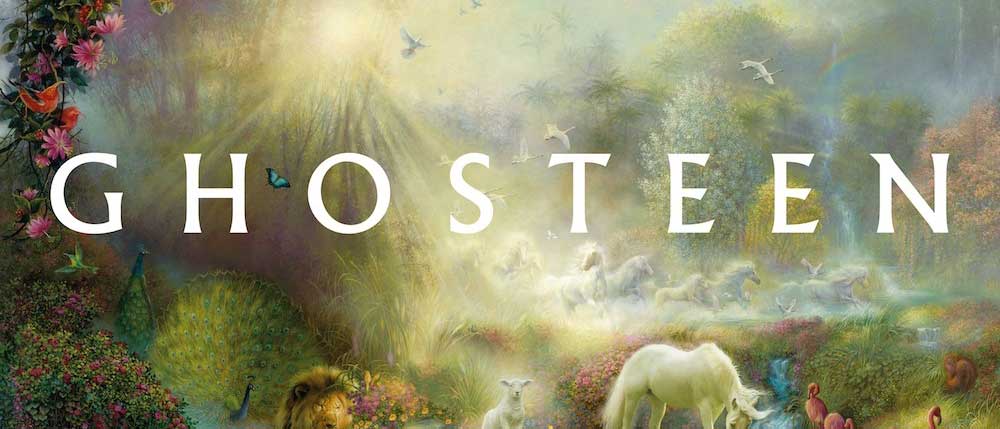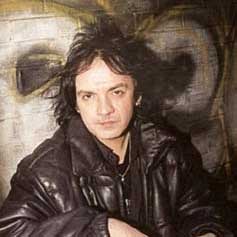You can trust Louder
Unveiled on Thursday night, Ghosteen was a surprise the outside world never knew existed until Nick Cave casually let slip about the new double album through his Red Hand Files website on 23rd September.
Ostensibly third and final part of the trilogy which started with Push The Sky Away in 2013 and continued with 2016's searing Skeleton Tree, Ghosteen is Cave’s transcendent, poetic masterpiece, and the most astonishing record of 2019.
Described by Cave as “a migrating spirit", Ghosteen is divided into two parts: an eight-song album Cave calls the "children", linked by the spoken word Fireflies to a second album, made up of two 12-minute epics, which he explains are their “parents”.
There's a different mood and ambience here than in previous Bad Seeds records. Ghosteen is an album which raises the bar in terms of lyrical expression, sonic exploration, and even how an album can be released in modern times.
Experiencing Ghosteen involves entering another man's world. It’s a world that is both painfully intimate and startlingly alien, as Cave and his right hand man Warren Ellis defy metaphysical artistic barriers to land in a place brimming with optimism, romantic affirmation, bloodletting lyricism and spiritual calm. It’s still cast in the shadow of a grief that will never go away, but that grief is now being dealt with in the best way Cave knows; with the most beautiful songs of an already masterful career.
Most of Skeleton Tree had been written and recorded before the unimaginable tragedy of Cave losing his son, Arthur, in July 2015. Its coruscating textures had already formed before he modified some lyrics. Now, we find Cave at the stage where that initial devastation gives way to handling the next phase. As Cave puts it: “to write beyond the trauma... to propel myself beyond the personal into a state of wonder."
Quite disarmingly, 1985 Bad Seeds single Tupelo is revisited in opener Spinning Song and its reference to ‘the king of rock’n’roll’, before a deeply-felt ‘And I love you’ changes the song’s focus. Cave's voice has never sounded richer or more confident, nor more vulnerable, as he leaps into disarming falsetto for its ‘peace will come in time’ conclusion.
The latest news, features and interviews direct to your inbox, from the global home of alternative music.
Bright Horses is essentially a piano ballad coated in the evocative, looped-up electronic gauze Ellis weaves throughout the album. Cave addresses the cold real world: ‘We're all so sick and tired of seeing things as they are/Horses are just horses and their manes aren't full of fire... And everyone is hidden and everyone is cruel/There's no shortage of tyrants and no shortage of fools.’ We later learn that love will save the day, as ‘My baby's coming back now on the next train.’
Waiting On You starts on chain-clanking loop before another wracked declaration of love as he waits for his baby to come home - perhaps, in this instance, it’s someone else.
Ringing clock chimes, mutant strings and electronic rustling punctuate the gorgeous Night Raid, while lustrous drones and a choral maze underscore Sun Forest. Cave exorcises past themes, embodied in his lyrics: ‘everybody hanging from a tree’; declaring ‘the future begins and I say goodbye to all that... and the past, with its savage undertow - let's go’. Galleon Ship is whispered and hymnal, before Ghosteen Speaks assures ‘I am beside you’ over vocal drones.
When Cave utters ‘I try to forget to remember’, it suggests he'll never be fully out of those black woods. The mood darkens with Leviathan, its weighty chords and woozy tones swelling around another declaration of love that morphs into a mesmerising mantra, setting the tone for part two's 12-minute title track. Its floating wall of electronic detritus drops midway to an unexpected domestic scenario: ‘Mama bear holds the remote, Papa bear just floats/Baby bear he has gone to the moon on a boat.’
Over hazy electronics, Fireflies states ‘There is no order here, there is no middle ground, nothing can be planned’ before Ghosteen’s closing magnum opus, Hollywood, brings the album to a mountainous peak, drums and flickering bass entering for the first time, 65 minutes in. Cave says he wants to buy a house in the hills, with ‘a tear-shaped pool and a gun that kills’, then pulls back to the intimately-ambiguous coda that's already got his followers guessing: ‘I'm just waiting for my time to come... I'm just waiting for peace to come’.
It's impossible for this writer to describe this album's impact without mentioning that I lost my soulmate last year. As Cave repeatedly affirms, he is so lucky to have his Susie as he wrangles a life that will never be the same again into its next phase.
Grief brought Cave to appreciate his devoted followers through the Red Hand Files and intimate Audience With shows. It lead him to appreciating life, other people and what he's got. Fans and critics have been swift to respond with affirmations and acclaim; many who've heard this remarkable album said they wept uncontrollably.
Has any artist ever gone so deep? All bars are raised, on so many levels.
Kris Needs is a British journalist and author, known for writings on music from the 1970s onwards. Previously secretary of the Mott The Hoople fan club, he became editor of ZigZag in 1977 and has written biographies of stars including Primal Scream, Joe Strummer and Keith Richards. He's also written for MOJO, Record Collector, Classic Rock, Prog, Electronic Sound, Vive Le Rock and Shindig!


